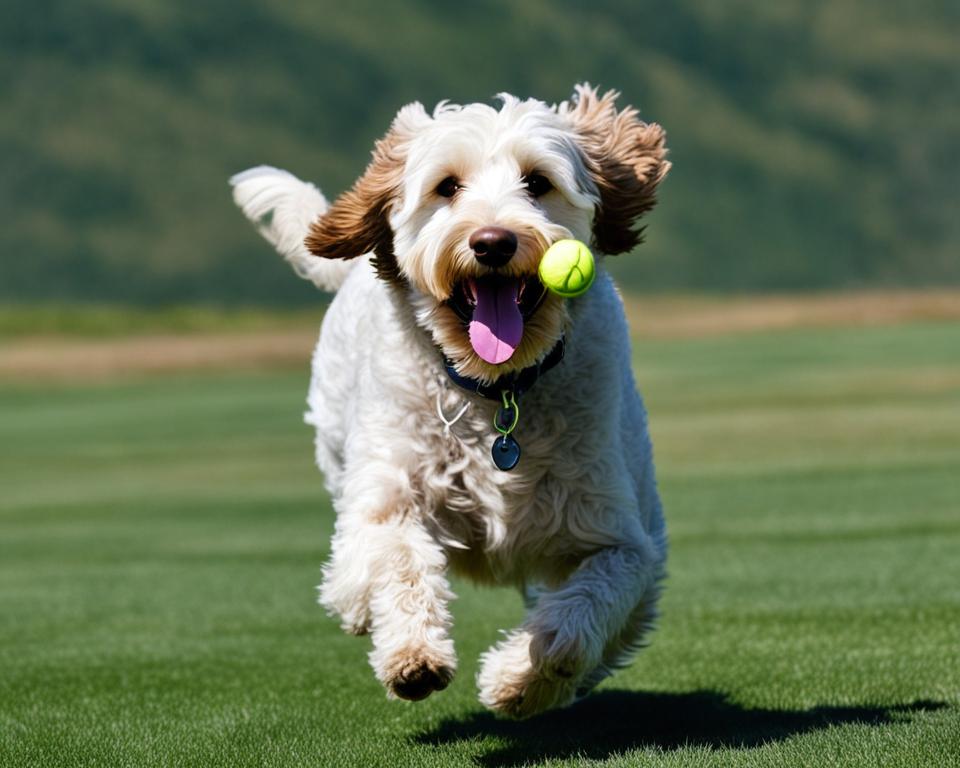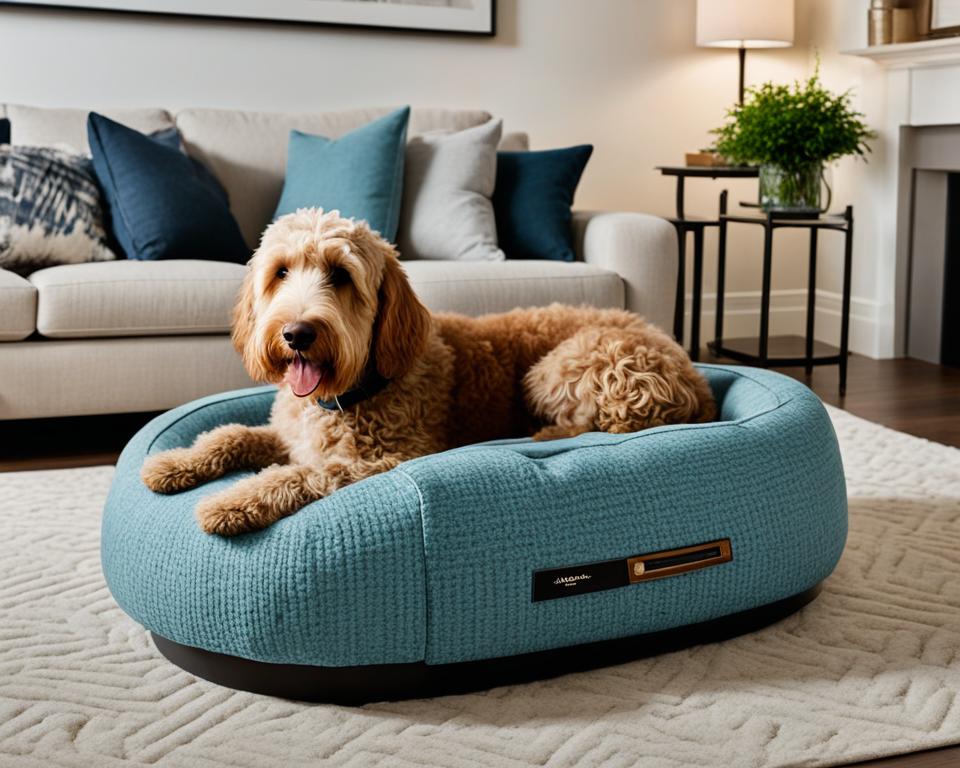As Labradoodles enter their senior years, they require specific care and attention. It is important to understand the unique needs of older Labradoodles and make adjustments to their health, diet, exercise, and living environment.
Labradoodles are considered seniors at different ages depending on their size and breed. Small breeds become seniors at 8-11 years, medium-sized breeds at 8-10 years, large breeds at 8-9 years, and giant breeds at 6-7 years. To ensure the well-being of senior Labradoodles, regular trips to the veterinarian for health screenings are recommended. These screenings can help detect potential health problems before they become symptomatic.
Proper nutrition is essential for senior Labradoodles. A specialized diet that is high in protein, lower in fat and carbs, and higher in fiber and antioxidants is recommended. This helps support their aging bodies, maintain a healthy weight, and provide the necessary nutrients for their overall well-being.
Exercise and mental stimulation should be adjusted to match the changing abilities of senior Labradoodles. While they may be less mobile than before, regular walks and low-impact exercises like swimming can still benefit their physical and mental health. Engaging in activities that provide mental stimulation, such as learning new tricks or playing games, can help keep their minds sharp.
Considerate interior design changes can also make a difference in the comfort of senior Labradoodles. Providing a comfortable bed, raised food and water bowls, and ramps to favorite spots can make their senior years more enjoyable and accessible.
Seeking expert guidance from veterinarians and professional groomers is crucial in ensuring the best care for senior Labradoodles. They can provide specific advice on health screenings, specialized diets, grooming needs, and general care for older dogs.
Key Takeaways:
- Caring for senior Labradoodles requires specific attention and adjustments to their health, diet, exercise, and living environment.
- Regular health screenings with a veterinarian can help detect potential health issues early on.
- A specialized diet, high in protein and fiber, and low in fat and carbs, is recommended for senior Labradoodles.
- Exercise and mental stimulation should be adjusted to match their changing abilities.
- Considerate interior design changes can make senior Labradoodles more comfortable in their living space.
- Seeking expert guidance from veterinarians and groomers ensures the best care for senior Labradoodles.
Veterinary Care for Senior Labradoodles
As your Labradoodle enters their senior years, routine veterinary care becomes even more crucial. Regular check-ups and health screenings can help detect potential issues early on and ensure your furry friend remains healthy and happy. Here are some important aspects of veterinary care for senior Labradoodles:
Geriatric Blood Screening
Geriatric blood screenings are an essential part of senior Labradoodle care. These screenings involve a series of tests that can detect common health problems in older dogs, including anemia, iron deficiencies, and thyroid dysfunctions. By identifying these issues early on, veterinarians can provide appropriate treatment and help your Labradoodle maintain optimal health.
Urine Analysis
Urine analysis is another valuable diagnostic tool for senior Labradoodles. This test can detect urinary tract infections (UTIs), diabetes, and other abnormalities that may affect your dog’s well-being. Regular urine analysis can catch these issues early on, allowing for timely treatment and better management of your Labradoodle’s health.
Senior Labradoodle Veterinarian Advice
Seeking advice from a senior Labradoodle veterinarian is essential in providing the best possible care for your aging companion. They can provide guidance on routine veterinary care, including vaccinations, parasite prevention, and dental health. They can also offer valuable advice on managing age-related conditions and provide personalized recommendations for your Labradoodle’s specific needs.
To ensure the well-being of your senior Labradoodle, it’s crucial to maintain a proactive approach to veterinary care. Regular check-ups, geriatric blood screenings, urine analysis, and expert advice from a dedicated veterinarian are key to keeping your furry friend happy and healthy throughout their golden years.
| Benefits of Veterinary Care for Senior Labradoodles | How it Helps |
|---|---|
| Early detection of health issues | Allows for timely treatment and management |
| Improved quality of life | Ensures optimal health and well-being |
| Expert guidance | Provides personalized recommendations for your Labradoodle |
| Peace of mind | Knowing your senior Labradoodle is receiving the best care |
Regular veterinary care is vital for senior Labradoodles to maintain their health and happiness. By staying proactive and seeking expert advice, you can ensure that your furry friend enjoys their golden years to the fullest.
Specialized Diet for Senior Labradoodles
As Labradoodles enter their senior years, their nutritional needs change, requiring a specialized diet to support their aging bodies. A well-balanced diet is crucial for maintaining their overall health and well-being.
Labradoodle Senior Nutrition
One of the key aspects of a specialized diet for senior Labradoodles is ensuring adequate protein intake. Senior dogs require higher levels of protein to support muscle maintenance and repair. Therefore, it’s essential to provide a high-protein diet that meets their nutritional requirements. Consult with your veterinarian to determine the appropriate protein levels for your senior Labradoodle.
Lower Fat and Carbs for Older Labradoodles
As Labradoodles age, their metabolism slows down, making them more prone to weight gain. To prevent obesity and related health issues, it’s important to provide a diet that is lower in fat and carbohydrates. This helps maintain a healthy weight and reduces the strain on their joints and organs.
High Fiber Diet for Senior Labradoodles
A high fiber diet is beneficial for the digestive health of senior Labradoodles. It promotes regular bowel movements, prevents constipation, and aids in the absorption of essential nutrients. Fiber-rich foods also feed the good bacteria in their gut, promoting a healthy digestive system. Include fiber-rich ingredients, such as fruits, vegetables, and whole grains, in your Labradoodle’s diet.
Antioxidants for Older Labradoodles
Antioxidants play a crucial role in supporting the immune system and reducing inflammation in senior Labradoodles. Including antioxidant-rich foods, such as blueberries, spinach, and sweet potatoes, can help combat oxidative stress and promote overall health. Additionally, fatty acids like Omega-3 and Omega-6 can also be beneficial for reducing inflammation in senior dogs.
It’s essential to consult with your veterinarian to determine the best diet plan for your senior Labradoodle. They can assess your dog’s individual needs and provide personalized recommendations based on factors such as their overall health, activity level, and any existing medical conditions. A well-rounded and nutritionally balanced diet is key to keeping your senior Labradoodle healthy and happy.
Exercise and Mental Stimulation for Senior Labradoodles
Even in their senior years, exercise and mental stimulation are crucial for the overall well-being of senior Labradoodles. While they may be less mobile than before, regular physical activity helps maintain their physical and mental health.
One of the best exercises for senior Labradoodles is walking. However, it’s important to consider their sensitivity to temperature changes. In colder weather, dress them appropriately to keep them warm and comfortable. Avoid walking during the hottest parts of the day to prevent overheating. By adapting their exercise routine to their needs, senior Labradoodles can enjoy quality time outdoors while staying safe.
Swimming is another excellent low-impact exercise option for senior Labradoodles. It provides a whole-body workout that helps strengthen their muscles without putting excessive strain on their joints. If your senior Labradoodle enjoys the water, consider taking them for a swim in a safe and supervised environment.
In addition to physical exercise, mental stimulation is equally important for senior Labradoodles. Older dogs can still learn new tricks and engage in mentally stimulating activities. Games like hide and seek or puzzle toys can help keep their minds sharp and prevent boredom. By challenging them mentally, you can provide the mental stimulation they need to stay mentally fit.
Benefits of Exercise and Mental Stimulation for Senior Labradoodles
Regular exercise and mental stimulation contribute to the overall mental and physical health of senior Labradoodles in several ways:
- Improved cardiovascular health
- Weight management and muscle tone
- Joint mobility and flexibility
- Enhanced cognitive function and memory
- Reduced anxiety and stress
- Promotion of social interaction and bonding
By providing appropriate exercise and mental stimulation, you can help your senior Labradoodle maintain their vitality, improve their quality of life, and promote a longer and healthier lifespan.
| Exercise Options | Benefits |
|---|---|
| Walking | Improves cardiovascular health, joint mobility, and weight management. |
| Swimming | Provides low-impact exercise that strengthens muscles without straining joints. |
| Mental Stimulation Activities | Enhances cognitive function, memory, and overall mental well-being. |
Remember to consult with your veterinarian to ensure that the exercise routine and activities you choose are appropriate for your senior Labradoodle’s individual needs and abilities. Each dog is unique, and their exercise requirements may vary based on their health condition and mobility.

Considerate Interior Design for Senior Labradoodles
Accommodating the changing needs of senior Labradoodles includes making changes to their living environment. By implementing thoughtful interior design modifications, you can enhance their comfort and well-being.
Comfortable Bed for Senior Labradoodles
A comfortable bed is essential for senior Labradoodles to rest and relax. Choose a bed that provides adequate support for their aging joints and regulate their body temperature effectively. Ensure the bed is appropriately sized to accommodate their changing needs, allowing them to stretch out comfortably.
Raised Food and Water Bowl for Older Labradoodles
Senior Labradoodles may experience discomfort or strain in their neck and shoulders while eating or drinking from lower bowls. To prevent neck strain and improve their posture, consider providing raised food and water bowls. This adjustment reduces the amount of bending and stooping required during mealtime, making it more comfortable for your senior Labradoodle.
Providing Ramp for Senior Labradoodles
If your senior Labradoodle has difficulty accessing their favorite spots due to mobility issues, consider providing a ramp. Ramps offer a gentle incline and a secure surface for them to navigate with ease. Whether it’s getting onto the couch, reaching the car, or climbing stairs, a ramp can make it easier and safer for your senior Labradoodle to enjoy their daily activities.

By incorporating these simple yet effective interior design changes, you can enhance the living experience for your senior Labradoodle. Prioritizing their comfort and accessibility ensures they can continue to enjoy their surroundings and maintain their quality of life.
Expert Guidance on Caring for Senior Labradoodles
When it comes to caring for senior Labradoodles, seeking expert guidance is crucial. Veterinarians are a valuable resource in providing specific advice for the well-being of older dogs. They can offer insights into health screenings, specialized diets, and overall care tailored to senior Labradoodles.
Professional groomers also play an important role in maintaining the health and appearance of senior Labradoodles. Their expertise allows them to carefully trim and maintain the coat, clean the ears, and address any grooming concerns specific to older dogs.
By seeking expert guidance, Labradoodle owners can ensure that their beloved pets receive the best care possible as they age. It’s important to prioritize senior Labradoodle health tips, such as proper nutrition, exercise, and mental stimulation in their senior years, alongside regular check-ups with veterinarians and grooming sessions with professionals.
FAQ
What age is considered senior for Labradoodles?
Labradoodles are generally considered seniors at different ages depending on their size. Small breeds become seniors at 8-11 years, medium-sized breeds at 8-10 years, large breeds at 8-9 years, and giant breeds at 6-7 years.
Why is regular veterinary care important for senior Labradoodles?
Regular veterinary care, including health screenings, is important for senior Labradoodles to detect potential health problems before they become symptomatic. Geriatric blood screenings and urine analysis tests can identify issues such as anemia, iron deficiencies, thyroid dysfunctions, UTIs, diabetes, and other abnormalities.
What should the diet of a senior Labradoodle consist of?
The diet of a senior Labradoodle should be high in protein to support their aging bodies and should be lower in fat, carbs, and calories to accommodate their slower metabolism. Additionally, a diet higher in fiber and antioxidants can aid in digestion, support the immune system, and reduce inflammation. Consult with a veterinarian for the best diet plan based on your Labradoodle’s individual needs.
How should exercise and mental stimulation be adjusted for senior Labradoodles?
Exercise for senior Labradoodles should take into account their changing abilities and sensitivity to temperature changes. Regular, low-impact walks, swimming, and mental stimulation through games and learning new tricks can help senior Labradoodles stay active and happy.
How can the living environment be adapted for senior Labradoodles?
Changes to the living environment can include providing a comfortable bed to regulate body temperature and support aging joints, raising food and water bowls to prevent neck strain, and providing ramps if they have difficulty accessing favorite spots. These adjustments can help senior Labradoodles navigate their living space with ease and comfort.
Where can I seek expert guidance on caring for my senior Labradoodle?
Veterinarians can provide specific advice on health screenings, specialized diets, and general care for older dogs. Professional groomers can assist with grooming needs, including coat maintenance and ear cleaning. Seeking expert guidance ensures that senior Labradoodles receive the best care possible as they age.

Leave a Reply